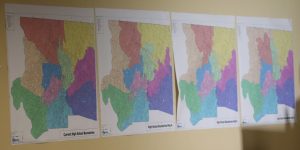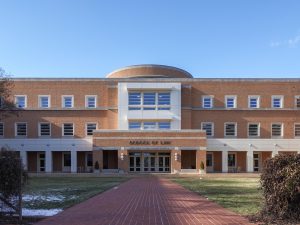Some states ease restrictions as virus rages
As North Carolina keeps its curfew in effect, other states are easing lockdowns
San Francisco lays dormant in the throes of a lockdown imposed by Calif. Gov. Gavin Newsom, who lifted the order last week.
February 4, 2021
As COVID-19 continues to wreak havoc across the country — almost 26 million Americans have contracted the virus and five states have passed a death toll of one death per every 500 residents — states are adopting wildly varied approaches to combating the virus.
In the last seven days alone, North Carolina recorded just under 40,000 cases. Meanwhile, statewide restrictions rank as the eighth strictest in the country, according to D.C. finance group Wallet Hub. California was ranked as the most restrictive, while Oklahoma was ranked as the least.
One of the most notable policies is the curfew order requiring North Carolinians to stay home from 10 p.m. to 5 a.m. The order, implemented in December, is set to remain in place until the end of February. North Carolina is one of only three states with curfews, the other two being Virginia and Ohio.
Some businesses adhere to this rule as well, shutting down before 10 p.m. Most enterprises, however, are only bound by this restriction, with a relatively long leash for other practices. Restaurants (both indoor and outdoor seating), retail stores, salons, gyms and entertainment venues such as museums, bowling alleys and amusement parks are all open. Bars that exclusively serve alcohol indoors are the only businesses that are not currently allowed to open.
Across the country, state governments are still trying to enforce curfews and other restrictions, including mask mandates. However, many of the states vary in the strictness of these rules and their enforcement.
New Mexico and Oregon are the only two states that have most of their businesses closed while an additional 14 states are a mix of open and closed, like North Carolina.
While there may be options for places to go and things to do, there are still some restrictions to ensure these places remain open. Face masks are mandatory while within North Carolina borders; however, they are optional outside with proper six-feet social distancing. Sixteen states either do not require masks at all or only require them sometimes.
As reported by the Seattle Times, state epidemiologist Rachel Herlihy cautioned the public during an online news briefing that it could be a while before all of the COVID-19 restrictions will be lifted.
“It’s going to probably be until at least this summer that we really need to continue all of the strategies that we’re using,” Herlihy said.
Many states are already ahead of this schedule, however, which begs the question: why are any states easing up when a new strand of COVID-19 is becoming more prevalent in the U.S.?
California plans on lifting the stay-at-home order, and several other states, including New York and Michigan are loosening up, too. In explaining the changes, many governors cite restlessness with the restrictions and are eager to return to “normal” life.
Others expressed concern with lifting these restrictions, however. Amesh Adalja of the Johns Hopkins Center for Health Security is concerned over how people will behave once these restrictions are gone.
“Anyone who has been following this pandemic should not have this misconception that lifting the stay-at-home order means the virus is over,” Adalja told the Seattle Times.
There are other ways to stay safe during this time. Public health officials began distributing the vaccine at the end of 2020. As of Sunday, about 25.2 million vaccines have been administered. That leaves over 300 million Americans waiting.
Currently, North Carolina is still in Phases 1 and 2 of distribution which means only healthcare workers, long-term care staff and residents and individuals 65 and older can get the vaccine. The next phase includes frontline essential workers (Phase 3), then moves to adults with high-risk for exposure or severe illness (Phase 4) and finally everyone else (Phase 5). As of now, it is unclear when the next phase will begin.
To find when you are eligible for the vaccine in North Carolina, you can access the “Find My Vaccine Group” tool on the COVID-19 section of the North Carolina Department of Health and Human Services website.














